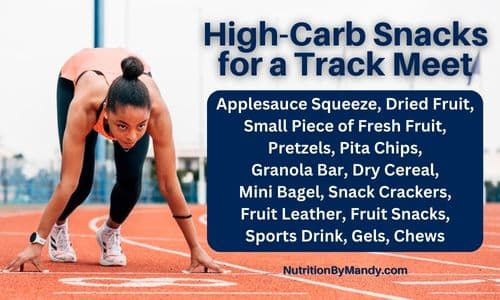Last Updated on February 16, 2026 by Mandy Tyler, M.Ed., RD, CSSD, LD
What to Eat Before a Track Meet for Optimal Performance
It is important for athletes to know what to eat before a track meet to provide them with the energy needed to compete at their best.
Having a sports nutrition plan in place for the track meet should be a key component of an athlete’s preparation for the day.
Let’s take a look at what track athletes can eat before and during a meet to keep them fueled through their final event.
What to Eat Before a Track Meet: Key Considerations
Planning what to eat before a track meet can often be challenging for athletes. Track athletes frequently compete in multiple events and the start time of the events often differs between meets.
In addition, track teams often travel together on a bus to the meet. Thus, athletes may arrive at the track several hours prior to the start of their first event.
Finally, the nutrition needs of track athletes can vary greatly, as track includes a wide variety of events. The nutrition strategy that works for a sprinter will look different from that of a jumper, thrower, or distance runner.
Plan Track Meet Meals and Snacks in Advance
It is important for athletes to have an individualized sports nutrition plan in place for the track meet.
Athletes should take time to plan in advance what they will eat before the meet. In addition, they should pack snacks they can eat on the bus and for energy throughout the day.

What to Eat Before a Track Meet: Pre-Meet Meal
When planning what to eat before a track meet it is important for athletes to consider the timing of their first event.
When possible, athletes should aim to schedule their pre-meet meal ~3-4 hours prior to the start of their first event. This allows time for the athlete to digest the meal and to go to the bathroom, if needed, before their first event.
To provide an example, if an athlete’s first event is scheduled for 10:00 am, the athlete should aim to eat breakfast around 7:00 am.
However, If the track meet starts early, an athlete may not have 3-4 hours before their first event to eat a meal.
In this case, I recommend eating a smaller high-carb breakfast ~2 hours before their event.
What to Include in a Meal Before a Track Meet
Similar to gas in a car, carbohydrates provide athletes with the energy needed to perform at their best. Thus, carbohydrates should be at the foundation of an athlete’s pre-track meet meal.
Along with carbohydrates the pre-event meal should include a moderate amount of protein.

Breakfast Ideas for Before a Track Meet
Breakfast ideas that athletes can eat before a track meet include:
- Fruit smoothie, bagel with nut butter and honey
- Protein overnight oats, fresh sliced fruit
- English muffin with egg and ham, Greek yogurt and berries parfait
- Pancakes with fresh strawberries and scrambled eggs
- Kodiak Cakes® toaster waffles with nut butter, hard-boiled eggs, fresh sliced fruit cup
- Breakfast wrap with eggs and turkey sausage, sliced melon
- Instant oatmeal with walnuts and raisins, banana
Lunch Ideas for Before a Track Meet
If the track meet starts in the afternoon or early evening, athletes will want to plan a high-carb lunch for their pre-meet meal.
Below are a variety of pre-track meet lunch ideas that athletes can enjoy.
- Turkey sub sandwich, pretzels, apple slices
- Grilled chicken wrap, baked chips, banana
- Grilled chicken breast, steamed rice, green beans, fresh sliced fruit, dinner rolls
- Pasta with tomato sauce, turkey meatballs or sliced grilled chicken, breadsticks
- Roasted salmon filet, baked sweet potato, fresh mixed berries, roll
What to Eat Before a Track Meet: Mini-Meals and Snacks
In addition to having a plan for the meal to eat before a track meet, athletes need to consider what snacks they will eat for energy throughout the day.
Athletes should take time to plan in advance and meal prep snacks they can take with them to the meet.
Athletes should not rely on finding food from the concession stands that will support their sports nutrition needs throughout the day.
Best Snacks for Track Meets
When athletes have limited time between events (<1 hour), the priority is to rehydrate and refuel with carbohydrates. During activity, the body uses its carbohydrate stores for energy, thus refilling these stores between events is important.
Eating a carbohydrate-rich snack between events will provide the athlete with a quick source of energy for the next competition.
Carbohydrate-Rich Snacks for Track Meets
Easy, high-carb snack ideas that athletes can enjoy between events include:
- Applesauce squeeze
- Banana, small piece of fresh fruit
- Mini bagels, dry breakfast cereal
- Low-fat granola bar, carbohydrate-based sports bar
- Pretzels, pita chips, snack crackers
- Animal crackers, graham crackers
- Dried fruit, fruit snacks, fruit leather
- Sports drinks, gels, or chews

Best Snacks for Track Meets: Mini-Meals
When athletes have more time between events they can turn their pre-event snack into a mini-meal.
The mini-meal should be high in carbohydrates, provide a moderate amount of protein, and be relatively low in fat and fiber.
Eating salty snacks between events can also be beneficial for athletes. The salt will help athletes with replacing the sodium lost in their sweat.
In addition, sodium helps to stimulate thirst (1); thus, encouraging athletes to rehydrate between events as well.
Mini-Meal Ideas to Pack for a Track Meet
Healthy mini-meal snack ideas that athletes can enjoy between events include:
- Peanut butter and jelly sandwich and a banana
- Turkey wrap and apple slices
- Crackers, sliced ham, string cheese, and orange slices
- Trail mix (made with pretzels, dried fruit, breakfast cereal, nuts)
- Bagel with nut butter and grapes
- Fig bars, hard-boiled eggs, and fruit cup
- Pretzels, jerky, and dried fruit
Foods to Limit in the Meal Before a Track Meet
In addition to knowing what foods to include in meals and snacks before a track meet, it is also important for athletes to know foods to limit.
Prior to a track meet, it is best for athletes to limit foods that are high in protein, fat, and/or fiber. Eating foods high in these nutrients too close to the start of the event may result in GI distress during activity (2).
This includes food items such as:
- Fried foods (donuts, French fries, fried chicken)
- High-fat or greasy meats (bacon, pork sausage, greasy hamburger)
- Heavy cream, cheese, or buttery sauces (alfredo sauce, queso)
- High-fiber breads or cereals
- Beans and high-fiber vegetables
- Dessert type foods (ice cream, brownies, fudge)

What to Eat Before a Track Meet: Reminders
In general, as the start time of the meet approaches the size of an athlete’s pre-event meal should decrease.
In addition, as it gets closer to the start of the meet, an athlete’s focus should be on consuming carbohydrates for energy.
Practice Your Track Meet Nutrition Plan
It is also important to understand that each athlete is unique. Thus, it is important for athletes to learn their individual tolerances and determine what foods they feel best eating prior to a track meet.
Athletes should not try new foods on the day of a track meet, but rather stick to those foods and beverages they feel most comfortable competing on.
What to Eat Before a Track Meet: Hydration with Meals and Snacks
Along with their pre-meet meals and snacks, it is important for athletes to hydrate as well.
Dehydration can negatively impact sports performance and increase an athlete’s risk of heat illness. Thus, athletes want to begin the track meet in an optimally hydrated state.
With the pre-track meet meal (~4 hours before the event), it is recommended that athletes drink 5-7 mL of fluid per kg of body weight (1).
For a 165-pound athlete, this calculates to be ~13 – 18 fluid ounces. In general, consuming approximately 2 cups of fluid (16 fl oz) with the meal before the track meet can assist athletes with meeting this goal.
In addition, eating foods that contain sodium with the pre-event meal, such as deli meat, pretzels, pita chips, and soup, can help the body to better retain the fluid drank before the meet (2).
Pro Tip: Athletes should continue hydrating in the hours leading up to their events and throughout the track meet.
Individualized Hydration Plan for Track Athletes
It is important to recognize that individual hydration needs vary amongst athletes. Athletes differ in both the amounts of fluid as well as electrolytes lost in sweat during an activity.
Athletes should consider working with a sports dietitian nutritionist for assistance with developing an individualized hydration plan.
The sports dietitian nutritionist can provide personalized guidance on hydrating during activity and develop a plan that meets the athlete’s specific needs.

Food Safety Reminders for a Track Meet
When packing meals and snacks for a track meet, athletes need to keep food safety in mind.
At the track meet, athletes should make sure all perishable foods are held cold (<40°F) throughout the day (3).
This includes items such as:
- Deli meat
- Cheese
- Hard-boiled eggs
- Greek yogurt
- Sliced fruit
Hold Cold Foods Cold at Track Meets
Any food item that is held without temperature control for two hours or more should be thrown away. This time frame decreases to 1 hour if the temperature outside exceeds 90 °F (3).
Athletes don’t want to take the risk of getting a foodborne illness. Therefore, it is necessary that they take steps to ensure their food is stored appropriately at the meet.
What to Eat Before a Track Meet: Set for Success
You are now set with a variety of ideas for what athletes should eat before a track meet to ensure they are fueled to compete at their best.
For additional sports nutrition tips for runners, check out my blog on post run breakfast ideas for athletes.
Join the Nutrition By Mandy Email List & Get a Free Athlete’s Grocery List
Click HERE to join the Nutrition By Mandy e-mail list. When you join you will receive a free athlete’s grocery list to print and take with you to the store.
About the Author
Mandy Tyler is a Sports Dietitian Nutritionist in the San Antonio, TX area. She is a Registered and Licensed Dietitian, a Board-Certified Specialist in Sports Dietetics, a Licensed Athletic Trainer, and is a Certified Exercise Physiologist through the American College of Sports Medicine. Mandy has experience working with athletes at the high school, collegiate, and professional levels. She believes the key to reaching one’s full potential, both in everyday life and in sports performance, relies on a healthy nutritional foundation.

If you are looking to take your performance to the next level, make sure to check out my new Sports Nutrition Game Day Guide. This downloadable guide is written to help athletes develop an individualized plan to achieve peak performance on game day.





